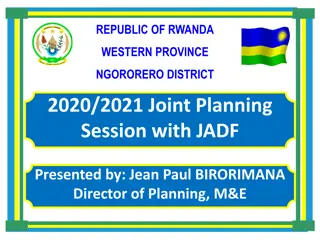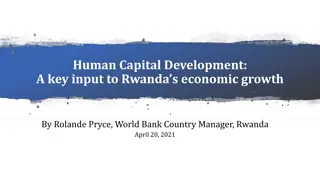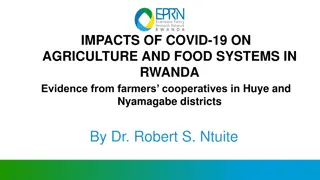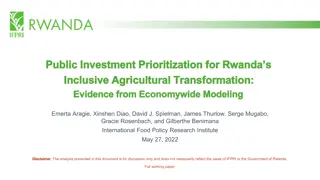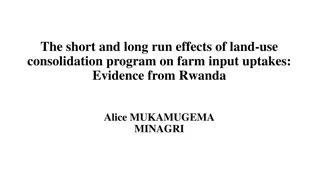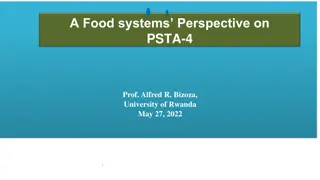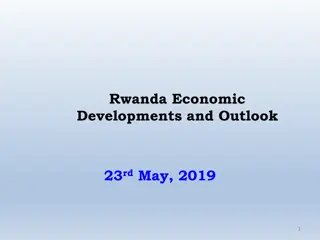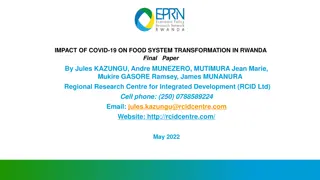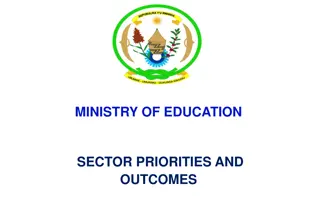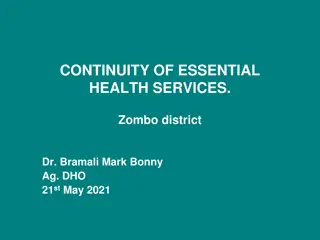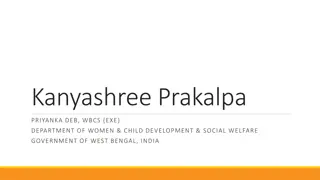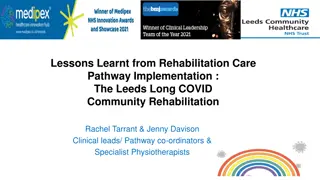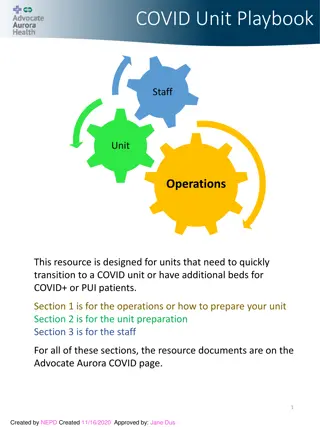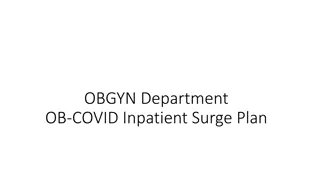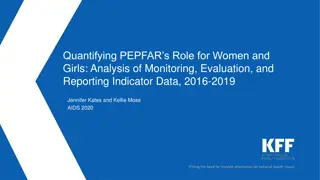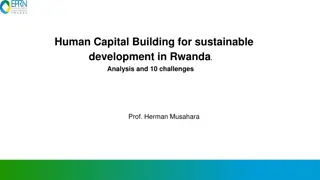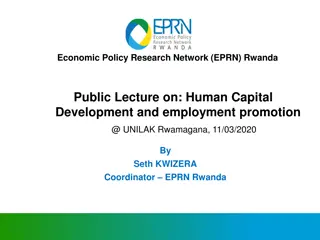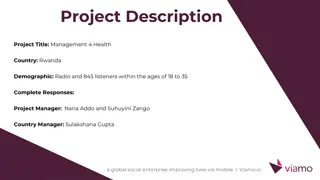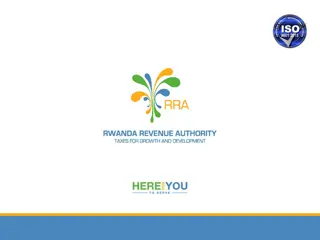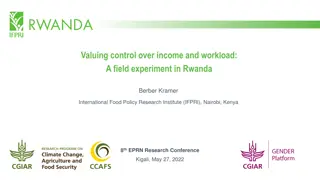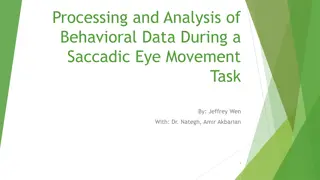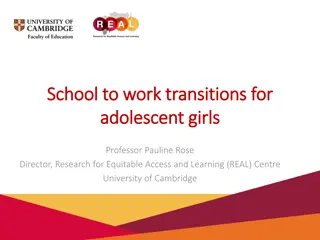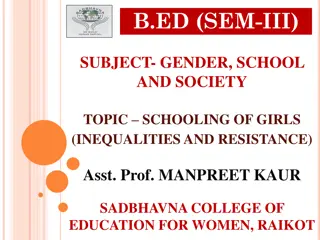Perceived Consequences of COVID-19 on Girls' Education in Bugesera District, Rwanda
This study explores the impact of COVID-19 on girls' education in Bugesera District, Rwanda. It highlights how the pandemic worsened existing inequalities for women and girls, leading to school closures and increased dropout rates among vulnerable groups. By using participatory methods, the research assesses the perceived consequences and suggests solutions to improve girls' education in the region.
Download Presentation

Please find below an Image/Link to download the presentation.
The content on the website is provided AS IS for your information and personal use only. It may not be sold, licensed, or shared on other websites without obtaining consent from the author. Download presentation by click this link. If you encounter any issues during the download, it is possible that the publisher has removed the file from their server.
E N D
Presentation Transcript
Perceived consequences of COVID-19 on Girl s Education in Rwanda: Evidence from Bugesera District, Rwanda Rosette NKUNDIMFURA & Dr. Dieudonne UWIZEYE
Outline Rationale and Objectives Methodology Findings Conclusion, Policy recommendations 2 Ministry of Trade and Industry 2013 Economic Policy Research Network
Rationale and Objective COVID-19 disease outbreak made existing inequalities for women, girls, and discrimination of other marginalized groups worse. The Government of Rwanda put in place various measures on people, goods and services, including a total lockdown and curfews, total or partial closure of businesses, closure of schools until September 2021 School closures do not just mean that girls are taking on more chores at home, it also lead to millions more girls dropping out of school before they complete their education, especially girls living in poverty, girls with disabilities or living in rural and isolated locations Many studies look at generic level of consequences of COVID-19 but in this one, the researcher want to focus on consequences of COVID-19 on girls education in Rwanda. The main objective of this study is to assess the perceived consequences of the pandemic on girl s education in Rwanda. More specifically, the study seeks: (a) To examine the effect of COVID-19 on Girls education (b) To suggest possible solutions to improve girls education in Rwanda 3 Ministry of Trade and Industry 2013 Economic Policy Research Network
RESEARCH METHODOLOGY The study used participatory and consultative design and used mixed quantitative and qualitative approaches. Cluster and Purposive sampling used for KIIs and FGDs in 5 different schools in Bugesera district has been randomly selected which are Nyamata High School, APEBU Nyamata ( TVET), Maranyundo Girls School ( Single School), Group Scolaire Kanzenze (12 Year Basic education) and les colombe primary school Data collection was through mixed quantitative and qualitative surveys, interviews (KIIs, & FGDs) and documents review; Informants were selected from school leaders, members and staff of related Ministries, CSOs and Bugesera District officials This process reached 7 Institutions/organizations which are MINEDUC, Rwanda Education for All Coalition (REFAC), Profemmes Twese Hamwe (FTH), Rwanda women s Network ,Rwanda Girl Guide, Girls Leaders Forum and coalition umwana ku isonga. Further, the study conducted 28 qualitative interviews including 4 FGDs in 4 schools and 24 Key Informants Interviews (KIIs) with practitioners/experts. 4 Ministry of Trade and Industry 2013 Economic Policy Research Network
Key findings Consequences of COVID-19 on Girls educationrevealed 6 main challenges: (i) Exposure to sexual abuse: Due to the closure of school, Girls become more exposed to Sexual abuse for some family members or neigbours , in lock down more than 200 girls got pregnant in Bugesera and 23,000 countrywide which is a big challenge to the country (ii)Negative peer influence: Girls are vulnerable and victims of peer pressure and can be desperate to fit in, so they tend to give in to many peer-pressure from their friends and social media which lead to sex-for-money or gifts, smoking, drug abuse, exchange of wrong ideas and information especially in the absence of the parents which impacted negatively their performance and exposed to adventure like slaying and prostitution (iii) Increase in child labour: During covid-19 , parents compelled to hunt for means of survival which have prompted some girls to join their mothers/fathers in raising income to support the family, including forced domestic work and dangerous tasks in mining, tea and coffee plantations. (iv) Increase in the burden of girls household chores: Girls usually are the ones who do most house chores. This poses a big challenge for girls, especially those in transitional classes, making it difficult for them to study and prepare for exams. 5 Ministry of Trade and Industry 2013 Economic Policy Research Network
Consequences of COVID-19 cont (V)Existence of technology gap between girls and boys: COVID-19 increased technology gap between girls and boys especially in rural areas they lack telephone and enough skills to study online, poor internet connections, internet data, Peer learning through group discussions, poor home learning environment. (vi) Drop out : Research respondents revealed that during the pandemic some girls dropped out due to teenage pregnancies, early marriage, lack of school fees and scholastic materials or find jobs (child labour) One head teacher said due to poverty and covid-19 effects, there is a shortage of scholastic materials and burden of school feeding fees , today every girl and boy in 9 & 12 years has to pay 6000Frw per term for School feeding. Imagine parents who have 3-5 children , it is very hard to afford it, some decide to let them out of school . In Bugesera District, 1778 students in primary school dropped out of school but recently 1342 students brought back, 435 are still out of schools and majority are girls; in secondary schools, 442 students dropped out ,335 brought back, It means that 107students are still out of school, In total 342 are still out of schools; 6 Ministry of Trade and Industry 2013 Economic Policy Research Network
CONCLUSION The study analysed the perceived consequences of covid 19 on girls education , the findings revealed that COVID-19 affected girls 'education in particular way, my big call out to all actors is to prioritize Girls' Education in its entirety and make schools gender responsive. Based on high political will and policy framework available to promote girls education in Rwanda, there is a need of continuous awareness raising on importance of education and some incentives for best academic performers not only for finalist but from Primary up to senior six in order to motivate girls toward school completion as we empower women and girls, we will realize a better future for all. 7 Ministry of Trade and Industry 2013 Economic Policy Research Network
Policy Recommendations MINEDUC and MIGEPROF in collaboration with Schools should organize regular public talk to inspire students and discuss on different topics likes Gender equality, GBV, Self-reliance , Resilience, goal setting, decision making and Sexual Reproductive health & Rights Schools need to have a counselor who will help students to discourage bad behavior, peer pressure, depression, stress management and school dropout. Government and CSOs should provide financial support for girls from poor families who are not able to cover school fees, school feeding fees and scholastic materials Existing Legal and policy frameworks to fight against child labour and child defilement should be implemented effectively Local leaders in collaboration with schools and parents should multiply their efforts to bring back student who dropped out , fight against teenage pregnancies and support teen mothers to continue their studies 8 Ministry of Trade and Industry 2013 Economic Policy Research Network
Policy Recommendations and conclusion Parents and schools should take care on mental health and psychological needs, because depression is real in order to avoid suicide, drug abuse , teenage pregnancies among young people for better future of the nation Digital literacy and ICT support facilities are needed, in the economic recovery process, the Government of Rwanda should put more efforts in supporting women and girls to access digital platforms MINEDUC and its stakeholders should conduct a countrywide study on effects of COVID-19 on education 9 Ministry of Trade and Industry 2013 Economic Policy Research Network
THANK YOU FOR YOUR KIND ATTENTION! EPRN Tel: 0788357648 info@eprnrwanda.org www.eprnrwanda.org



